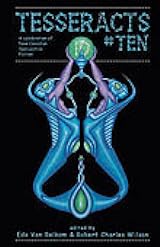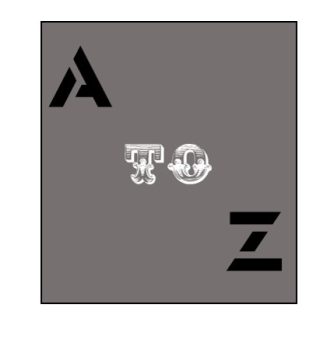A to Z Reviews: “Permission,” by Mark Dachuk
Tesseracts is a Canadian anthology series that published 23 issues between 1985 and 2019. First edited by Judith Merril, each subsequent volume was edited by different authors and featuring new science fiction by various Canadian authors. One volume, Tesseracts Q, edited by Jane Brierley and Elisabeth Vonarburg, featured English reprints of stories originally published in French. Mark Dachuk’s “Permission” appeared in Tesseracts Ten in 2006, edited by Edo van Belkom and Robert Charles Wilson.
Dachuk has created a world in which everyone’s goal appears to be to leave the planet earth. Luana lives alone in a small house with an attached garden. When rockets launch from a nearby facility, she looks at them longingly, wanting to leave the world behind, but she doesn’t have the wherewithal to purchase her own tickets to leave the earth. Her hopes rest in the possibility that one of the plants growing on her property, the permission, will one day flower. She surmises that the house’s previous owner was lucky enough to get a blossom, which led to his departure.

Cover by Colleen McDonald
Luana lives with a sense of nostalgia. She had a husband and a son, but following the son’s death, her marriage disintegrated, leaving her with nothing to hold her to Earth and giving her another reason to leave it all behind. She is so wrapped up in her own suffering and memories, however, that she doesn’t see the overtures of friendship from the townspeople, who attempt to welcome her into the society, making due the best they can as the people who are left behind on earth.
“Permission” looks at the need for some people to sequester themselves and build a life alone, even when others are more than willing to be there to support them. Luana can’t see the affection the townspeople have for her or their willingness to adopt her as one of their own. She is too busy wallowing in her own past and her hopes of achieving a future that may not be achievable and seems only to be available to her through a random event.
Unfortunately, one of the things the story lacks is a reason for the townspeople to be so willing to be a part of Luana’s life. It isn’t that Luana isn’t a sympathetic character, she is. However, sympathetic as she is, she appears to constantly reject everyone in an attempt to keep from being hurt by them leaving (or, perhaps, to keep from hurting them when she finally gets to board a spaceship). That story of one-sided relationship, however, is exhausting and, at some point, hits the point of diminishing returns.
 Steven H Silver is a twenty-time Hugo Award nominee and was the publisher of the Hugo-nominated fanzine Argentus as well as the editor and publisher of ISFiC Press for eight years. He has also edited books for DAW, NESFA Press, and ZNB. His most recent anthology is Alternate Peace and his novel After Hastings was published in 2020. Steven has chaired the first Midwest Construction, Windycon three times, and the SFWA Nebula Conference six times. He was programming chair for Chicon 2000 and Vice Chair of Chicon 7.
Steven H Silver is a twenty-time Hugo Award nominee and was the publisher of the Hugo-nominated fanzine Argentus as well as the editor and publisher of ISFiC Press for eight years. He has also edited books for DAW, NESFA Press, and ZNB. His most recent anthology is Alternate Peace and his novel After Hastings was published in 2020. Steven has chaired the first Midwest Construction, Windycon three times, and the SFWA Nebula Conference six times. He was programming chair for Chicon 2000 and Vice Chair of Chicon 7.
